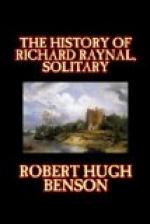But the tale of the clerk who went to him and sought to shake him, I heard nothing of, save from Master Richard’s own lips. None knew of what had happened, and some afterwards thought that it was the fiend who went to Master Richard, but some others that it was indeed one of the clerks of the court who had perhaps stolen the keys, and gone in to get credit to himself by persuading Master Richard to confess that all was a delusion. For myself, I do not know what to think. [I suspect that Sir John was inclined to think it was the devil, for at this point he discusses at some length various cases in which Satan so acted. He seems to imply that it was a peculiar and cynical pleasure to the Lord of Evil to disguise himself as an ecclesiastic.]....
Now, old Master ... said mass before my lord cardinal at seven o’clock, and then went to his own chamber, but he was immediately sent for again to my lord, who appeared to be in a great agitation. My lord told him that one had come from the ankret to bid him let Master Richard go, for that it was not the young man who was afflicting the King, but God Almighty.
“But he shall not play Pilate’s wife with me,” said my lord in a great fury, “I shall go through with this matter. See that you be with me, Master Priest, at noon, and we will see justice done. I doubt not that the young man must go for his trial.”
He told the clerk, too, that Master Blytchett was greatly concerned about his grace, and that the court would be in an uproar if somewhat were not done at once. He had sat three hours last night with ... and ... and ... and ..., [It would be interesting to know who were these persons.] and they had all declared the same thing. But he said nothing of the whipping of Master Richard, and I truly believe that he knew nothing of it.
So the hour for the questioning was fixed at noon, and the place to be in my lord cardinal’s privy parlour.
* * * * *
Now that morning, as I told you, I was no more than usually heavy. I remembered Master Richard’s name before God upon the altar, and at ten o’clock I went to dinner in the parsonage. It was a very bright hot day, and I had the windows wide, and listened to the bees that were very busy in the garden. I remember that I wondered whether they knew aught of my dear lad, for I hold that they are very near to God, more so than perhaps any of His senseless creatures, and that is why Holy Church on Easter Eve says such wonderful things about them, and the work that they do. [This refers to the Exultet sung by the deacon in the Roman rite on Holy Saturday.]
For they fashion first wax and then honey. It is the wax that in the church gives light and honour to God, and it is to the honey-comb that God’s Word is compared by David. [Sir John continues in this strain for a page or two.]....
It is not strange then that I thought about the bees, and the knowledge that they have.




